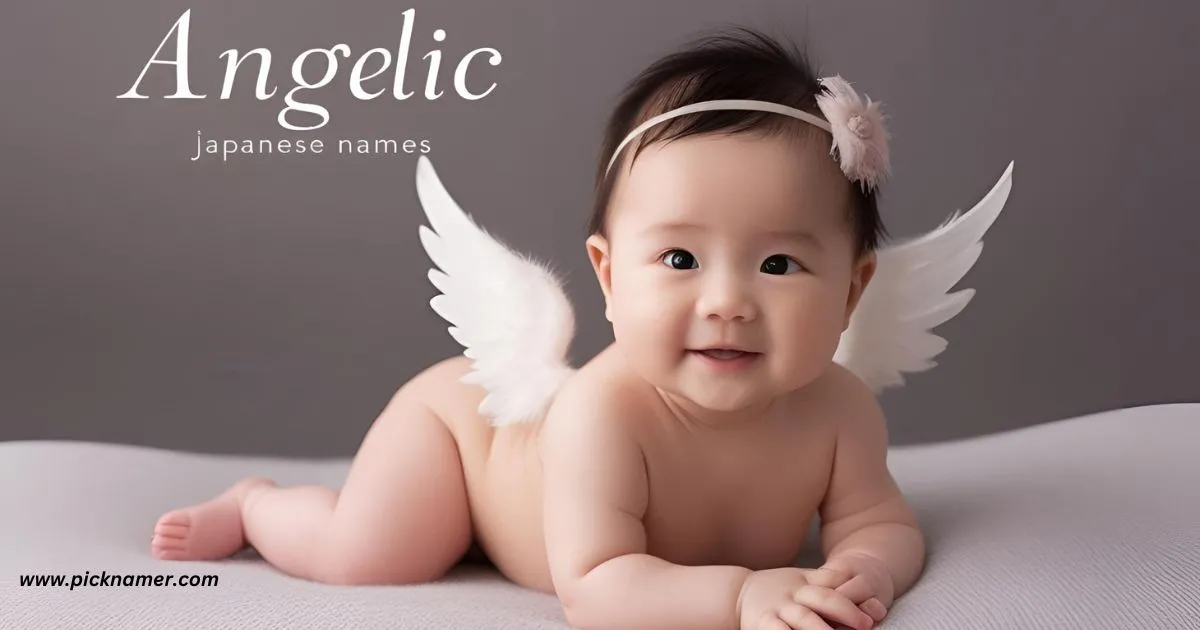The Japanese names for angels carry deep meanings that reflect societal values and ideals. From Tenshi, symbolizing purity, to Hikari, meaning light, these names embody a profound connection to the divine.
They hold great significance in Japanese society, influencing art, literature, and spirituality.
Unravel the impact on individuals as we explore how these names shape the cultural ethos and define the roles in the world.
Each name provides insights into underlying beliefs, offering a glimpse into how perception of celestial beings has evolved.
If you seek a name for inspiration or wish to understand the significance of angelic figures in Japanese society, this guide will illuminate their true essence. Dive in and discover a world of heavenly beauty!
Japanese Girls Names Meaning Angel
- Tenshi (天使) A direct translation of angel in Japanese.
- Seraphina (セラフィナ) Inspired by Seraphim, the highest order of angels.
- Meika (明佳) Means bright and beautiful blessing.
- Hikari (光) Symbolizes light, purity, and divinity.
- Soutenshi (蒼天使) Translates to blue angel, representing serenity.
- Nozomi (望) Means hope and divine wish.
- Amane (天音) Represents heavenly sound or melody.
- Haruka (遥香) Signifies distant fragrance, like a divine presence.
- Sayaka (清香) Means pure fragrance, linked to angelic purity.
- Misaki (美咲) Represents beautiful bloom, resembling heavenly grace.
- Airi (愛梨) Means love and pear, symbolizing a sweet angelic spirit.
- Yua (結愛) Signifies gentle and loving soul.
- Sana (咲奈) Represents blossoming happiness, like an angel’s smile.
- Rina (莉奈) Symbolizes jasmine, a flower associated with angels.
- Kanon (花音) Means flower sound, referring to angelic harmony.
- Hinata (陽向) Represents sunlight, warmth, and protection.
- Shizuku (雫) Symbolizes pure and sacred water, like angelic tears.
- Emina (恵美奈) Means blessing and beauty.
- Suzume (雀) Represents sparrow, often seen as a divine messenger.
- Nagisa (渚) Symbolizes tranquil shores, like a peaceful angelic presence.
Japanese Boy Names Meaning Angel
- Tenshiro (天司朗) Means heavenly messenger with wisdom.
- Haruto (陽翔) Represents soaring toward the sun, like an angel.
- Masaki (正輝) Symbolizes righteous radiance and divine light.
- Souta (蒼大) Means big blue sky, resembling heavenly vastness.
- Renji (蓮司) Represents lotus order, a divine purity.
- Takumi (匠) Signifies masterful skill, like a celestial guardian.
- Hikaru (光) Means radiant light, often linked to angels.
- Reiji (怜司) Symbolizes wise guardian, like an angelic protector.
- Daiki (大輝) Represents great brilliance and divine shine.
- Itsuki (樹) Means tree, symbolizing strength and stability like an angel’s guidance.
- Kaito (海翔) Signifies ocean flyer, resembling an angel soaring through the sky.
- Shouma (翔真) Represents true flight, like a heavenly messenger.
- Raito (雷翔) Means lightning flight, a symbol of celestial power.
- Hideo (英夫) Signifies excellent man, like a noble angel.
- Naoki (直輝) Represents honest radiance, a trait of divine beings.
- Takeru (猛) Means warrior, often seen as a guardian angel.
- Kenzou (賢蔵) Symbolizes wise protector, like an angelic guide.
- Yamato (大和) Represents great harmony, a divine virtue.
- Soutaro (蒼太郎) Means deep blue sky, like an angel watching over.
- Taiga (大河) Signifies mighty river, symbolizing angelic strength and flow.
Meaning Angel Japanese Warrior
- Tenshi no Senshi (天使の戦士) Means angel warrior、 a divine protector.
- Raito Senshi (雷翔戦士) Represents thunder warrior with angelic power.
- Takeru no Tenshi (猛の天使) Means fierce angel warrior.
- Hikari Senshi (光戦士) Signifies light warrior, fighting for justice.
- Masaru Tenshi (勝天使) Represents victorious angel in battle.
- Gekko Senshi (月光戦士) Means moonlight warrior、 a celestial fighter.
- Tenrai no Kenshi (天雷の剣士) Represents heavenly thunder swordsman.
- Seigi Tenshi (正義天使) Symbolizes justice angel, a righteous warrior.
- Shinsei Senshi (神聖戦士) Means sacred warrior with divine strength.
- Hibiki Tenshi (響天使) Represents resonating angel, spreading divine sound.
- Arashi Senshi (嵐戦士) Means storm warrior、 a force of heavenly power.
- Rekka Tenshi (烈火天使) Signifies blazing angel warrior.
- Kuro Tenshi (黒天使) Represents black angel, a mysterious protector.
- Shinobi Tenshi (忍天使) Means ninja angel, a silent warrior.
- Daishou Senshi (大勝戦士) Signifies great victorious warrior.
- Soutenshi no Ken (蒼天使の剣) Represents blue angel’s sword.
- Hatenkou Senshi (破天荒戦士) Means unbreakable angel warrior.
- Kibou Senshi (希望戦士) Symbolizes hope warrior, bringing divine peace.
- Shinseina Kenshi (神聖な剣士) Means sacred swordsman, an angelic fighter.
- Eien Senshi (永遠戦士) Represents eternal warrior, fighting for good.
Meaning Angel Japanese Male
- Tenshi (天使) Directly means angel.
- Hikaru (光) Symbolizes heavenly light.
- Masaru (勝) Represents victorious like an angel.
- Renji (蓮司) Means divine order.
- Raito (雷翔) Signifies lightning angel.
- Shouma (翔真) Means true flight.
- Hideo (英夫) Represents noble angelic presence.
- Naoki (直輝) Symbolizes pure and righteous light.
- Kaito (海翔) Means flying across the sea like an angel.
- Itsuki (樹) Represents guardian tree, like an angel’s presence.
- Takeru (猛) Means mighty protector.
- Daiki (大輝) Symbolizes great brightness.
- Kenji (賢司) Means wise and divine leader.
- Haru (春) Represents spring, symbolizing renewal.
- Yamato (大和) Means harmony like an angelic guide.
- Shin (真) Symbolizes truth and purity.
- Soutaro (蒼太郎) Represents deep sky guardian.
- Takumi (匠) Means masterful celestial protector.
- Reiji (怜司) Symbolizes wise angelic guidance.
- Eita (永大) Represents eternal greatness.
Meaning Angel Japanese Female
- Tenshi (天使) Directly means angel.
- Amane (天音) Means heavenly sound.
- Hikari (光) Symbolizes divine light.
- Nozomi (望) Represents hope and heavenly blessing.
- Seraphina (セラフィナ) Inspired by angelic beings.
- Yua (結愛) Means gentle love.
- Misaki (美咲) Represents beautiful bloom.
- Sana (咲奈) Symbolizes angelic joy.
- Nagisa (渚) Represents tranquil shores.
- Airi (愛梨) Means loving angel spirit.
- Rina (莉奈) Represents jasmine, a flower associated with angelic purity.
- Kanon (花音) Means flower sound, referring to angelic harmony.
- Hinata (陽向) Symbolizes sunlight, warmth, and divine protection.
- Shizuku (雫) Represents pure and sacred water, like angelic tears.
- Emina (恵美奈) Means blessing and beauty, reflecting divine grace.
- Suzume (雀) Symbolizes sparrow, often seen as a messenger from the heavens.
- Meika (明佳) Represents bright and beautiful blessings, resembling an angel’s glow.
- Sayaka (清香) Means pure fragrance, like the presence of an angel.
- Haruka (遥香) Symbolizes distant fragrance, carrying a heavenly aura.
- Tsubasa (翼) Means wings, a strong symbol of angelic freedom and grace.
Conclusion
The Japanese names for angels hold deep meanings rooted in societal values and ideals. If it’s Tenshi, symbolizing purity, or Hikari, representing light, each name reflects a profound connection to the divine.
These names shape the perception of celestial beings and their roles in the world, offering rich insights into Japanese society and its underlying beliefs.
Embracing these names helps us understand their significance and the impact on individuals who cherish them.
Key Insight About Meaning Angel Japanese
1. What does Tenshi mean in Japanese?
Tenshi (天使) means angel in Japanese and represents purity and a connection to the divine.
2. What is the significance of angel names in Japanese society?
These names reflect cultural ethos, underlying beliefs, and the perception of celestial beings in traditions, literature, and spirituality.
3. What does Hikari symbolize?
Hikari (光) means light, signifying hope, guidance, and divine presence in Japanese culture.
4. How do angel names impact individuals?
They inspire people with ideals of goodness, guiding their thoughts on morality and spiritual beliefs.
5. Are angel names used in modern Japan?
Yes, they appear in literature, anime, and daily life, shaping the roles in the world of fictional and real-life figures.

Hi! I’m Liam Reed, an author at PickNamer.com. I’m here to share insights and creative suggestions to help you find the perfect name for any occasion.

